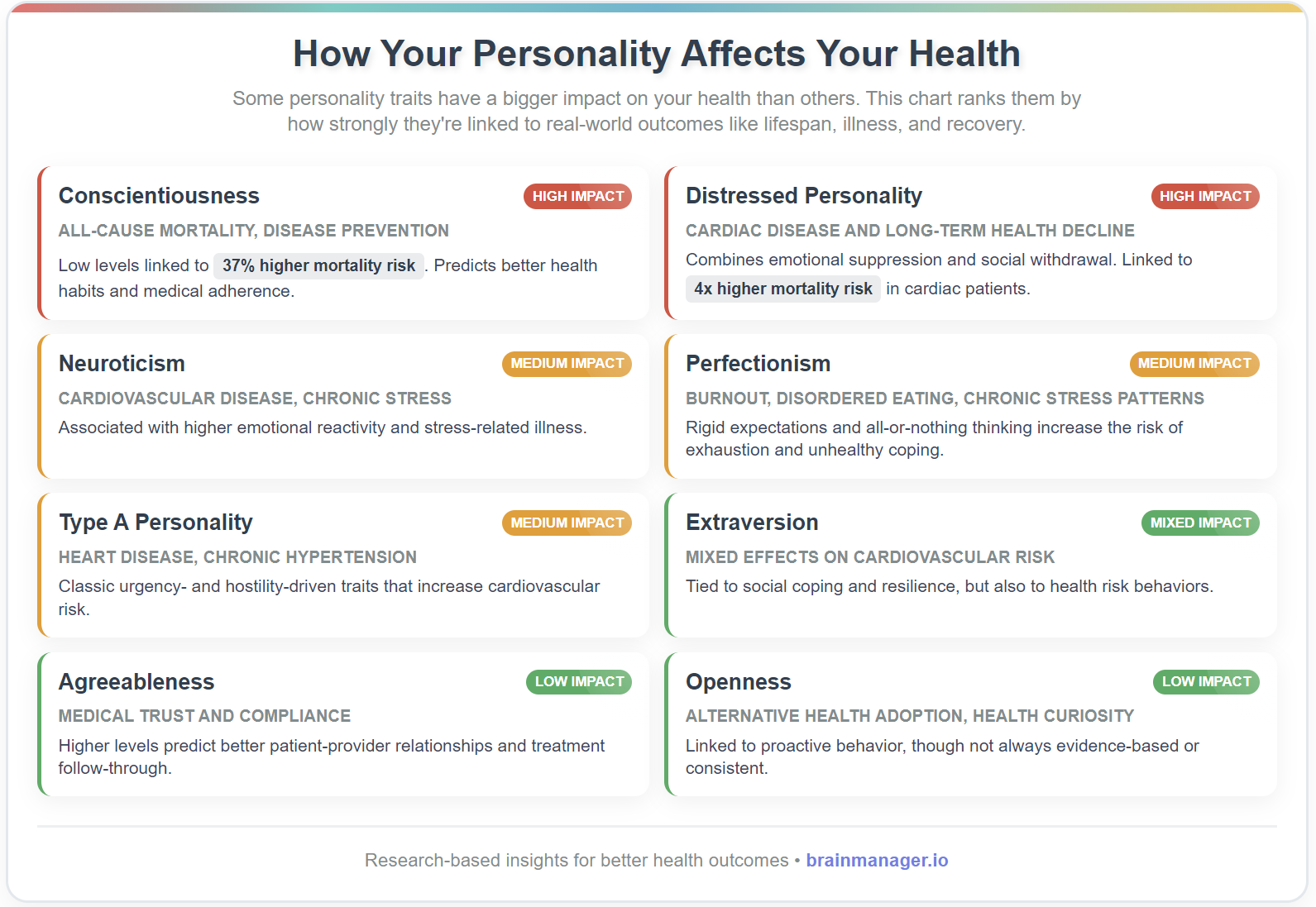How Your Personality Affects Your Health (and What You Can Do About It)
Think personality is just about social skills or emotions? It also shapes your daily health choices—like how you handle stress, follow routines, and seek care. This guide breaks down the science behind key personality traits, shows what puts you at risk, and gives clear tips to work with your strengths (and support your weak spots).


Back
8 mins read
Your personality isn’t just a reflection of how you think or interact with others—it plays a measurable role in your physical health.
Certain traits predict how likely you are to follow through on treatment, adopt healthy habits, or recover from illness. Others correlate with higher risk for chronic stress, cardiovascular problems, and even early death.
In this article, we’ll start with the hard data: the personality traits most strongly linked to physical health outcomes. Then we’ll explore how those traits show up in everyday life—through habits, behaviors, and stress responses—and how you can work with your personality, not against it, to protect your well-being.
The Science: What Personality Predicts About Your Health
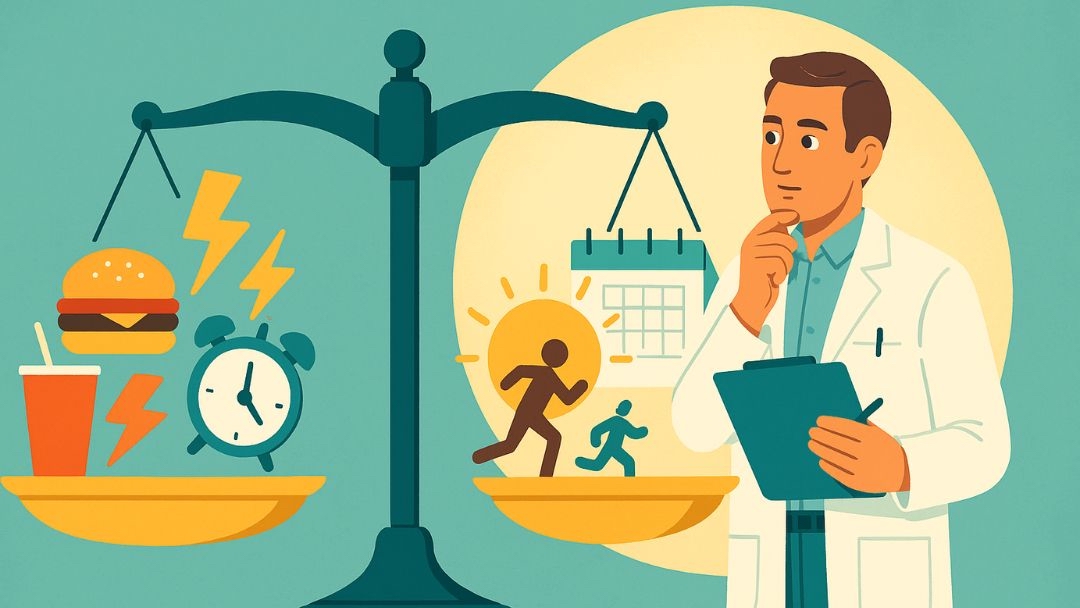
Personality isn’t just linked to how we feel—it’s also tied to how long we live, how our bodies handle stress, and how likely we are to follow through on care. Large-scale studies have shown that personality traits are more than just quirks. They’re predictive patterns associated with everything from lifespan to chronic illness to treatment compliance.
Here’s what the research tells us.
Conscientiousness stands out: In a meta-analysis of over 76,000 adults, people low in conscientiousness had a 37% higher risk of early death compared to those with higher scores—largely due to differences in lifestyle, treatment adherence, and risk avoidance (Jokela et al., 2013). Childhood conscientiousness has even been shown to predict better physical health and longevity decades later (Hampson et al., 2007).
High neuroticism has been linked to increased cardiovascular risk, poorer immune function, and chronic inflammation, likely due to heightened stress reactivity and difficulty with emotional regulation (Lahey, 2009).
Individuals with a Distressed Personality (also referred to as Type D)—defined by high negative affect and social inhibition—face significantly worse health outcomes. In cardiac patients, this profile has been associated with a fourfold increase in mortality risk (Denollet et al., 1996) and lower long-term recovery following cardiac events.
Other traits influence health indirectly. High agreeableness and extraversion are linked to better communication with healthcare providers and stronger support networks—both of which can promote resilience and treatment success. Meanwhile, openness is associated with curiosity-driven health-seeking behaviors, though not always with consistent follow-through or evidence-based decision-making (Ozer & Benet-Martínez, 2006).
Perfectionism and Type A traits also play a role. Both are linked to chronic stress and a higher risk of burnout, which can take a toll on physical health over time. Type A behavior—marked by urgency, competitiveness, and hostility—has been associated with increased rates of hypertension, cardiovascular disease, and depression. Perfectionists, while often diligent, may experience high internal pressure and harsh self-judgment, contributing to emotional exhaustion and unhealthy coping patterns.
The chart below highlights the most studied personality traits and their impact on health, listed in order of their observed significance.
These patterns don’t dictate your future, but they can shape your health trajectory, especially when left unexamined.
If you're curious where you land on traits like conscientiousness or neuroticism, taking a Big Five personality test can help you understand your starting point—and what to watch out for.
Understanding the Big Five Traits (OCEAN) and Your Health
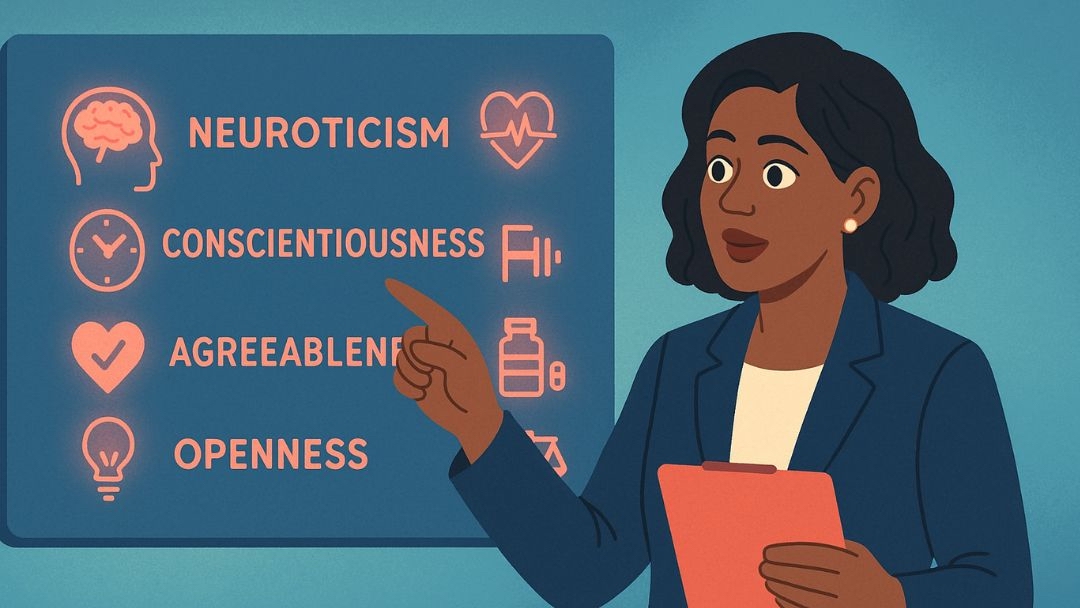
While several personality frameworks exist, the Big Five offers the most consistent and research-backed lens for understanding how personality influences health. These five broad traits aren’t types—they’re spectrums.
Most people score higher in some and lower in others, creating a unique personal profile that can shape their habits, resilience, and health behaviors.
Openness vs. Closedness
Openness encourages health exploration and experimentation, while lower openness favors consistency and structured care.
People high in openness tend to be curious, imaginative, and willing to try new things—including wellness routines, unconventional therapies, or emerging health trends. This openness can lead to proactive behavior and greater engagement in self-care. However, it may also lead to inconsistent routines or an overreliance on unproven treatments.
At the other end of the spectrum, people low in openness (sometimes called “closed to experience”) tend to prefer traditional, familiar approaches. They may be more consistent with long-term care plans but less open to adapting when new solutions are needed.
Conscientiousness vs. Lack of Direction
Conscientiousness supports better health through planning, responsibility, and follow-through, while lack of direction can lead to inconsistency in self-care.
Highly conscientious people are organized, reliable, and likely to engage in preventive behaviors like regular checkups, healthy eating, and exercise. Their ability to plan, stick to routines, and think long-term is strongly linked to better health outcomes and increased longevity.
At the lower end of the spectrum, lack of direction can show up as difficulty setting priorities, following through on goals, or maintaining structure. Health routines may feel overwhelming or get pushed aside. These individuals benefit from external tools—like checklists, reminders, or partner accountability—that help translate good intentions into consistent action.
Extraversion vs. Introversion
Extraversion promotes health through social support and activity, while introversion may protect against overstimulation and support focused self-care.
Extraverts often thrive in group settings, benefit from peer accountability, and seek out support when facing health issues. Their social energy can encourage participation in physical activities or community-based wellness.
Introverts, by contrast, may prefer solitary or quiet environments, and they might avoid group fitness classes or social health settings. However, they may also excel at introspection and routine-based care. The key is recognizing what energizes you—and creating a health approach that respects your natural rhythm.
Agreeableness vs. Disagreeableness
Agreeableness supports communication and compliance, while lower agreeableness may lead to skepticism—but also self-advocacy.
Highly agreeable individuals tend to cooperate with medical professionals, follow treatment plans closely, and avoid interpersonal conflict. These traits often improve care outcomes—but can also lead to passivity, especially if they hesitate to question advice or report ongoing symptoms.
People lower in agreeableness may be more independent and skeptical of authority. While this can sometimes cause friction, it may also lead to stronger self-advocacy and a more active role in navigating care. The challenge is balancing skepticism with trust when it counts.
Neuroticism vs. Emotional Stability
Neuroticism increases health risk through heightened stress response, while emotional stability supports resilience and regulation.
High neuroticism is characterized by emotional reactivity, anxiety, and sensitivity to stress. These individuals may experience more physical symptoms (like headaches, stomach issues, or insomnia) and tend to seek reassurance through frequent medical visits. The constant emotional load can strain the immune system and overall health.
Emotionally stable individuals (low in neuroticism) are typically calm, grounded, and better able to regulate their stress response. This resilience helps protect long-term well-being. That said, emotionally stable people may underreact to symptoms or delay seeking care—especially if they minimize discomfort.
Beyond the Big Five: How Personality Patterns Influence Health Behavior
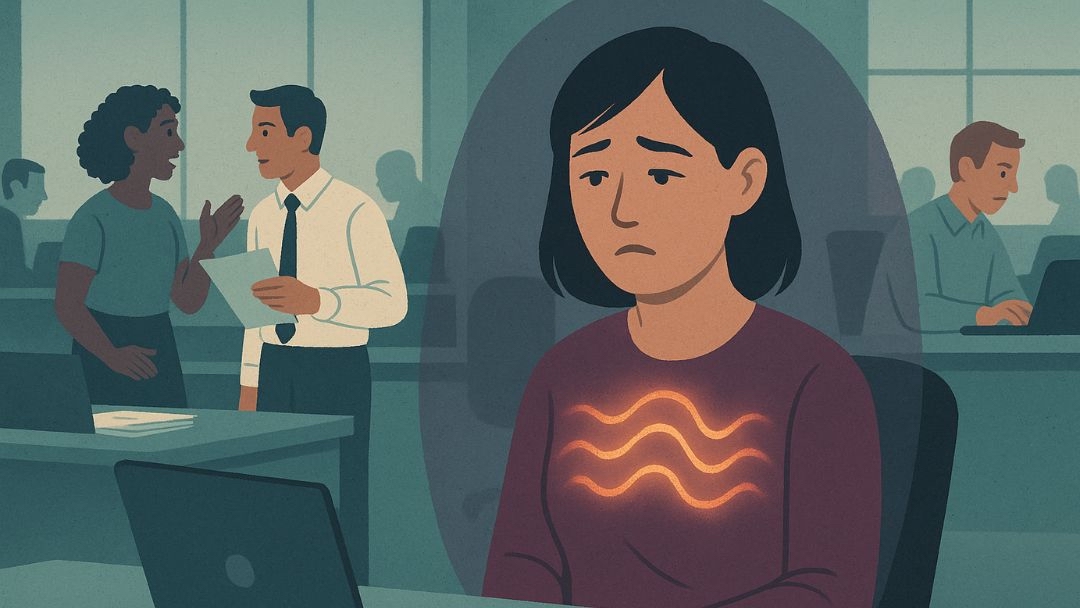
While the Big Five traits offer a strong scientific foundation, other personality patterns—like perfectionism, Type A urgency, or emotional coping styles—can also shape our daily health decisions. These patterns influence how we handle stress, follow routines, and respond to physical symptoms.
Perfectionism
Perfectionistic behavior impacts health by promoting rigid routines, harsh self-criticism, and burnout when goals aren’t met.
Perfectionists often set excessively high standards for themselves, especially around diet, exercise, or appearance. This trait is linked to disordered eating, compulsive fitness, and a tendency to view health setbacks as personal failure.
The resulting shame cycle can lead to long-term physical and emotional exhaustion. Learning to accept progress over perfection and building flexibility into routines is key to maintaining both physical health and emotional balance.
Type A Personality Traits
Type A behavior influences health by reinforcing stress-driven habits that wear down the body over time.
The classic Type A profile—competitive, driven, time-sensitive—isn’t inherently unhealthy. But when it includes chronic urgency, overwork, and hostility, it becomes a risk factor.
Type A individuals often ignore early warning signs, sacrifice sleep for productivity, and normalize high stress levels, which can damage cardiovascular and immune function over time. Structured downtime, intentional rest, and goal-setting with recovery built in can help mitigate the risks.
Distressed Personality (Type D)
Type D behavior affects health by combining emotional suppression with chronic negative mood—amplifying stress-related illness.
In medical research, this pattern is known as Type D personality. It’s defined by two core traits: frequent negative emotions (such as worry, irritability, or hopelessness) and social inhibition (avoiding emotional expression or connection with others).
People with this profile often keep stress bottled up, hesitate to seek support, and feel isolated even when surrounded by others. Over time, this combination has been linked to higher rates of cardiovascular disease, poor immune response, and slower recovery after illness.
MBTI-Inspired Health Patterns
MBTI types aren’t predictively linked to specific health outcomes, but behavioral patterns associated with each type can shape self-care habits.
Judging types (like ISTJs or ENTJs) may stick to routines and follow treatment plans closely. Perceiving types (like INFPs or ENFPs) may be flexible and adaptive, but struggle with consistency. Extraverts often seek social support, while Introverts may avoid overstimulating care settings. These patterns aren’t diagnostic, but they offer clues about where extra support may help.
Enneagram and Health Triggers
While not clinically validated, Enneagram types can offer insight into emotional reactions that influence health behavior.
For example, Type 1s may aim for rigid control over routines, striving for a perfect wellness plan. Type 6s might second-guess advice or worry excessively about symptoms. Type 9s may delay care to avoid discomfort or conflict. Understanding your Enneagram fears and motivations can help you catch reactive patterns and develop healthier responses.
Related: Can Stress Make You Sick?
How Personality Affects Social Support—and Your Health

Social connection is one of the strongest predictors of physical and emotional well-being—and a key ingredient in long-term happiness. In a meta-analysis of 148 studies (308,849 participants), people with stronger social relationships had a 50% higher likelihood of survival than those with weaker ties.
This matters because personality plays a major role in how people build, maintain, and lean on their support systems. Traits like extraversion, agreeableness, or emotional stability can influence how we give and receive help, especially during illness, stress, or recovery.
- Extraverts often build wide networks and benefit from frequent contact.
- Introverts may prefer fewer, deeper relationships—and still need emotional safety to thrive.
- Agreeable individuals tend to create harmony, while those lower in agreeableness may struggle to maintain relationships during health setbacks.
- Highly neurotic individuals may experience social friction or isolate when overwhelmed.
- People with a distressed personality (Type D) often crave connection but hold back emotionally, making it harder to build the kind of support that protects health.
Regardless of your trait profile, investing in meaningful connections and learning how to accept support can strengthen your mental resilience and physical health.
How to Use Your Personality to Support Better Health
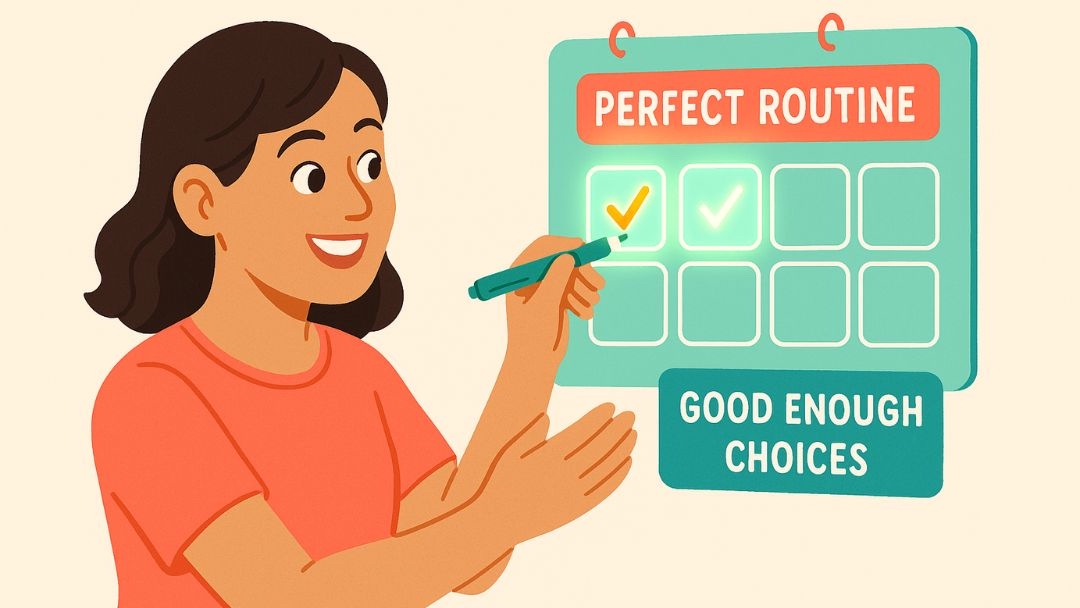
Now that you understand how your traits connect to your health, here are some specific ways to work with your personality—not against it.
- If you’re highly conscientious: Treat rest like a task. Put downtime on your calendar, and recognize that recovery is part of being effective—not a sign of weakness.
- If you’re lower in conscientiousness: Use environmental cues like visual trackers, phone alarms, or buddy systems to stay consistent with health routines.
- If you’re high in neuroticism: Build a daily stress buffer. Use tools like breathwork, grounding exercises, or sensory resets to bring your nervous system back to baseline.
- If you’re a perfectionist: Redefine success in smaller units. Instead of aiming for the perfect diet or routine, focus on consistent “good enough” choices that add up.
- If you identify with Type A traits: Create short-term goals that include built-in recovery. Schedule wind-down time after intense effort, and resist the urge to fill every gap with work.
- If you’re more introverted: Prepare for healthcare appointments ahead of time. Make a list of questions or symptoms so you don’t have to speak off the cuff, and build in solo recovery time afterward.
- If you’re highly open: Try new wellness ideas, but give them time to work. Choose one change at a time and track how it affects you before switching it up.
- If you’re very agreeable: Practice saying what you need. It’s okay to question advice or speak up about discomfort, even if it might cause friction.
- If you’re lower in agreeableness: Focus on building trust with a single healthcare provider. A solid relationship can make you more likely to follow through with care.
- If you relate to a distressed personality: Start by expressing emotions in low-pressure ways—like journaling or private voice notes. Over time, practice sharing how you feel with one trusted person to build emotional safety and reduce isolation.
These aren’t one-size-fits-all fixes. But they’re a starting point—practical ways to make your personality work in favor of your health instead of undermining it.
Related: 7 Effects of Meditation on Health and Our Bodies
Final Thoughts: Know Yourself, Shape Your Health
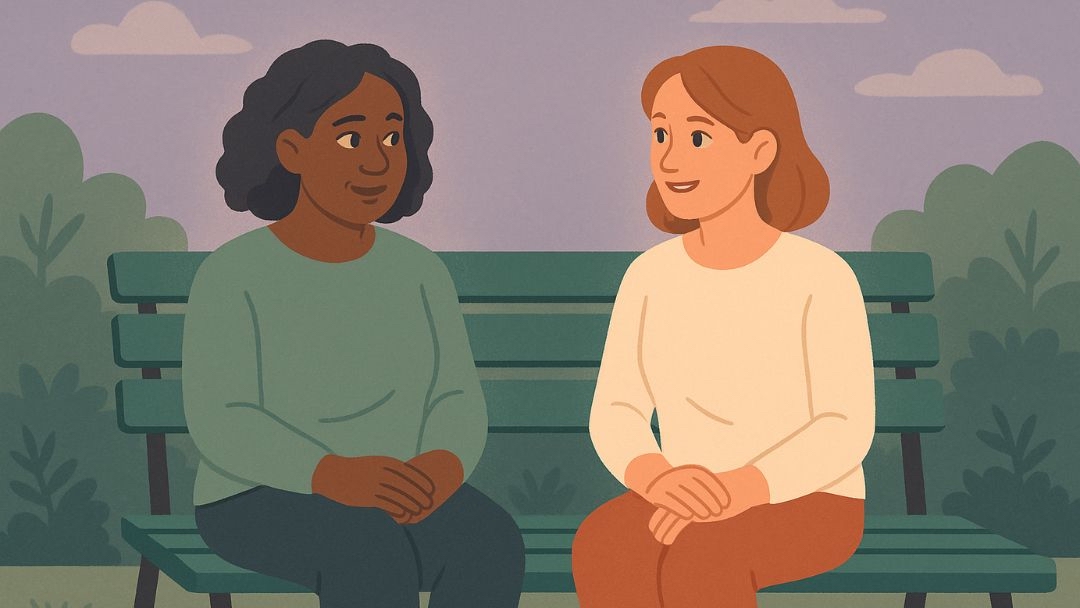
Your personality doesn’t determine your fate. But it does influence how you respond to life’s demands, care for yourself, and relate to your body.
The more you understand your patterns, the better equipped you are to shift course before health becomes a crisis.
Want to get specific? Take our Big Five Personality Test to discover your profile and learn how to turn your traits into strengths for better well-being.


Return to Blog
